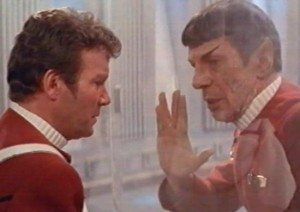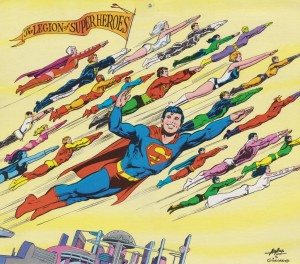I grew up in the ‘80s. Back then, nerds were not cool. They were nerds. If you read comic books, you were not cool. If you could explain at length, and did explain at length, whether or not anyone asked you to, why Star Trek II was the best Star Trek movie ever, you were not cool. If you knew who Rick Baker was, and why he mattered, you were not cool. If you loved weird science fiction and horror movies, you were not cool. Nerds were nerds. The ignored. The hated. The underdogs. Movies like Meatballs and Revenge of The Nerds worked because that’s who you root for in movies: the underdogs.
Nerds are not the underdogs anymore.
All those ‘80s kids have grown up. For the past decade, they have been rising higher and higher in the movie world. And now? Now they run it. They make the movies, they review the movies, they decide what’s good, they decide what gets made. And what gets made? Nerd movies. Nerds have gone mainstream, and their movies are killing the industry.
What do we have to look forward to in the realm of big summer movies this year? Iron Man 3, Star Trek 2 (or more accurately 12), Superman (the 6th), Wolverine (the 2nd? 5th? I don’t even know how to count these), and Pacific Rim. Nerd movies. Which are, respectively, a third sequel of a comic book character, a second sequel of a third reboot of a TV show, the first movie of a third reboot of a TV show based on a comic book, the first movie of a reboot of a spin-off of a thrice sequelized series once re-booted based on a comic book, and the first movie made from a series of Japanese comics (which features the holy-nerd-grail of both giant robots and giant monsters doing battle). It’s hard to keep track of how many times we’ve seen these movies, so quickly are they made, sequelized, rebooted, reconfabulated, de-re-contextualitized, and otherwise vermiciously zarniwooped.
Every single big budget picture nowadays has its roots in either ‘80s nerd movies, when all of these filmmakers were kids, or comic books. And unlike in the ‘80s, we’re supposed to take these movies seriously, or so insist the nerds who review the movies at the nerd movie websites. We’re supposed to call Shane Black an auteur, when what we’re watching is corporate movie-making at its most advanced and refined, the new corporate, run by the one-time nerds all grown up into the reigning elite, they who both spend and make more money than anyone who came before.
Marvel and Universal have superhero movies planned well into the teens. If you’re not up on this stuff, The Avengers isn’t just another blockbuster superhero movie, it’s the start of “Phase Two” of the Marvel on-screen universe. As for DC, they seem to be suffering from indecision and ineptitude, but not for lack of trying. Man Of Steel is here, Spiderman Again Part 2 is on its way, and the Batman reboot can’t be far behind. And those are just the major superheroes. There are another, oh, million or so in the wings–Biscuit Man, The Amazing Spatula, She-Narwhal, The Flying Insole, Mr. Cricket, to name but a few–itching for their shot at the big-time. As for Disney? They bought Star Wars. Coming soon, a new Star Wars movie once a year, every year, for so long as we all shall live.
I suppose it’s inevitable. Like the ‘60s hippies who grew up and ushered in the era of ‘80s greed and blockbusters in the first place, now the nerds are done with cult films, and done with being the little guys. Comic-Con is the new mainstream. There are hordes of people on-line, haunting movie sites, who will defend to the death everything from Tron: Legacy to The Watchmen, two movies so mainstream your little sister and frat-boy brother count them among their favorites. Which is the other irony. These nerd movies, though made by nerds and beloved by nerds, are designed for audiences at large. How many of the 90 billion people who saw The Avengers had ever read an Avengers comic? Precious few. What’s important is that nerds are now the tastemakers. If they want Avengers, that’s what they get. That’s what we get.
Aw, hell and goddammit! I don’t know what I’m driving at, my brain is jetlagged, I don’t know what time it is, or where I am, or whether the world-famous monument I’m supposed to visit tomorrow is about to be blown up by Zod or The Demonic Fish Lord (who I hope to see in the movies soon). I think I have a point in here somewhere, and the point is that nerds aren’t nerds anymore, which has left me with a bit of a personality quandary, having once been that weird ‘80s kid who had a ranked list of favorite directors by age 12 that included David Cronenberg. Hurm.
Wait now, who am I again? I’m not a movie-nerd, because movie-nerds aren’t nerds, they’re not-nerds, while the actual nerds are the popular kids running the show. And they’re running it into the ground! Yeah, that’s my point! Is there no room left for an original bloated-budget movie? Are we really reduced to having only Christopher Nolan and James Cameron to cite? How did we get here? Where are you driving us, nerds? To a world with nothing but superheroes blowing shit up? Is that really where you always wanted to be? Wouldn’t you rather create a world where studios funded and promoted smaller movies too, like Upstream Color and John Dies At The End? Wouldn’t you rather a world that took ‘80s movies like Repo Man, Videodrome, and The Hidden as its inspiration? And fer chrissakes, not as remake fodder to prey on our nostalgia! Spare us your RoboCop, Evil Dead, and Clash of The Titans remakes! Why not encourage new talent to make weird new movies? Ya know, nerdy movies?
I know. Weird movies are out there, creeping around the margins, same is it ever was. Thank heavens. It’s just a shame that the one-time weirdos from the ‘80s have forgotten their weirdo roots and have instead used their new-found powers to merely intensify the size, scope, and reach of the mega-blockbusters begun in their youth. Look upon thy works, ye nerdy, and despair…







It is a sad state of affairs. What made characters like the X-Men appealing to those of us (ahem) who actually made our moms drive us to the comic book store once a month to get new issues (thanks Mom), was that they were OUTSIDERS. They were misunderstood, unfairly despised, and basically nerds with nards. [New pitch idea: Nerds with Nards: a superdork trilogy]
Now… X-Men are Halle Berry and James Marsden and Huge Actman. These people; they are not nerds. They are not outsiders. They are like the ‘fake geek girls’ who put on heather grey tights and non-prescription glasses and pretend to read books so that they can amp up their already extant sex appeal… to NERDS who are now somehow not outsiders themselves? I blame Steve Jobs.
Nerding should not be lucrative. That’s like one of the laws of the universe or something.
So yeah. Huge Actman is a fake geek girl. I want to see William Macy and Paul Reubens and Tom Waits as superheros! What? They made that movie already and it wasn’t that good? Fine. Then let’s just move on and leave the superheroes for the genuine nerds who truly need their company.
Okay. So maybe I’m not sure what my point is either, but I have one somewhere. Also, I’m pretty sick of superheroes, serial killers, zombies, and everything and anything Star Wars. It’s over. Let it go.
I think 3 of the top grossing 2012 flicks were comic based (and probably the same for each of the five years before that). So good luck convincing Hollywood to euthanize that golden goose anytime soon. In defense of the comic book movies, most are far superior in substance to the poorly conceived action blockbusters from original material in the past 10 years. As an 80s nerd (once a nerd, always a nerd?) I think it’s a blessing that Hollywood finally embraced existing source material, although there should be room for original stuff too. If you want original, I guess you must turn to TV for breaking bad, etc.
What confounds me is the dearth of grass roots productions! Where are the modern George Romeros, Kevin Smiths, and Sam Raimis? These guys shot 16mm with traditional lighting setups and got their films distributed before the Internet was mainstream. Now, Night of the Living Dead could be shot over a weekend with a few friends, a cheap digital camera, and a couple hundred dollars of Halloween make up, then distributed to millions of people cost free. And those guys did it while Hollywood monopolies were in full swing. Where are the independent filmmakers today? How come no one has jump started this market? There are more vfx artists available to moonlight than ever, and home computing power can easily handle the software, so indies might even compete with visual blockbusters on some level. I suspect the original Robocop could be produced for pennies with current consumer technology.
This same argument goes for the music industry too; despite cheaper equipment and better distribution than ever, Hollywood products continue to dominate the spotlight. Yet producing and distributing content has never been cheaper and easier. Sure, Steven Soderbergh discussed the challenges of bringing indie movies to market in Hollywood. But perhaps emerging artists might look elsewhere to reach audiences, especially with so many services streaming to the living room now. For anyone who has perused the dregs of Netflix’s online sci-fi library, for example, it is difficult to believe the service would refuse to distribute a competently produced indie film.
Most superhero movies have substance? I must be missing those ones. Hollywood has been happy to plunder any convenient existing sources for years. They do it purely out of cowardice. They want to make movies that already have a built-in audience. Superhero movies are the highest grossing movies of late because they’re the highest budget movies of late. Whatever Hollywood throws its money and marketing behind is by definition going to be whatever makes the most money. Personally, I’d rather they spend it on original stories. Not that there’d be any greater number of good movies resulting, but at least they’d be originally bad. These superhero movies are all the same, however slick the better ones are.
To use the filmmaker examples I cited above, I am not a fan of either Inception or Avatar, but still I’d take those over however many Iron Mans and Hulks and Spidermans Hollywood churns out. Those movies are all the same. I’ve seen them before. Many many times.
As for grassroots filmmaking, it might be cheaper by far than in the old days, but making a good movie is no easier now than it ever was. It’s hard to maintain a compelling narrative for 90 minutes. Did you see Upstream Color? There’s a perfect example of what you’re talking about. Carruth wrote, directed, starred, edited, and scored it, and is releasing it himself. And it’s great.
On the other hand, multi-millionaire movie and TV star Zach Braff goes begging for money on kickstarter to make his movie. Remember the days when filmmakers with passion used all the money they had to get their movies made? Now you can give your money–not invest it–to rich actors so they can make crap. It’s a strange state of affairs out there…
Well, I find the modern superhero movies are on the whole relatively better than the paper thin character development of most blockbusters being produced before the recent comics crush. I concede they are entirely formulaic. By the way, I would also suggest that a knuckle sandwich is relatively better than a sh*t sandwich. Now, I’m not making the case for more superhero movies. I just recall darker times, such as when Face off was widely accepted as a blockbuster with substance, or when Collateral Damage or End of Days were the most anticipated action flicks of the year (though I will go to bat for Schwarzenegger in his prime). Relatively, I still prefer the knuckle sandwich that is the plat du jour. However, if there were a proposition to devote the marketing budgets of these movies to the development of original narratives, then I would wholeheartedly support it. I will watch a new PT Anderson movie over X-Men number whatever anytime.
I am excited to see Upstream Color largely due to your rave review on this site. There are several reasons why I did not see it in the theater yet, but if it were available to purchase and stream to my TV, I would have watched it already. Upstream and the Kubrick documentary are at the top of my to see list.
I’m not sure what to say about Kickstarter. It’s patrons achieve new highs in fund raising but corresponding lows in cultural standards and moral responsibility every week. The concept is revolutionary, but I’ve never heard of anything of any merit being accomplished through it. Perhaps I am a curmudgeonly troll, but the substantial amount of expendable cash which is quite literally thrown by the general public at projects bereft of any value, in culture, utility or otherwise, completely stuns me.
Kickstarter reminds me of the resolve of ancient nations like the Egyptians who pooled their resources together to construct impressive monuments, if instead the Egyptians had endeavored to build giant phalluses (phalli?) in the desert, each generation aspiring to build them bigger and bigger. If Kickstarter existed in ancient Egypt, would they have chosen to build giant tombs or giant penises? Lately, I’m uncertain of the answer to that question. I suppose Zach Braff and Kristen Bell may enlighten us.
Ya’ll are both crazy.
Any alternative to Hollywood funding is a seismic shift. Sure. It’s a lot of hipsters funding stuff that sounds cool to them now, but what’s to stop, say, our friend Jacob from using Kickstarter to finish his documentary (which he did), or you SB, from making another film? You don’t like Zach Braff or Kristen Bell? Waa waa waaa. You’re like the guys following Moses across the Red Sea and complaining about the mud on your shoes. What would you say if Don Coscarelli funded his next film on Kickstarter? How is that any different from Zach Braff using it?
Speaking of which, Braff made a totally decent film with some personality the first time out and wants to (can) make another without sucking Hollywood dick; Great for him. You didn’t like Garden State, but it was a massive success and it was an original story with no superheros or fighting robots. I enjoyed it. Kristen Bell’s show has so many fans that they can crowdfund a feature? Even better. Never watched her show, but I wish her well. I wish some of my favorite cancelled shows had done the same. [And yes, the studios/networks should have funded those films in the way the artists envisioned, but they didn’t/wouldn’t, which means they didn’t see the profit in it and nothing more. There are goals to filmmaking beyond giant profits. This is an avenue to pursuing those goals. {And we’re ‘giving money’ instead of ‘investing it’? How is that any different from pre-buying a movie ticket? the investment is in producing material you think you’ll enjoy and appreciate. I didn’t spend a dime to get The Third Man made but that one is still paying off for me. And that’s the level of investment most of these people are putting in: $20, $30, not $50,000,000.}]
It’s easy to slag on X-Men or Face/Off (which I also like for its totally inane insanity), but it’s damn near impossible to make a good, small film and bring it to market (as Supreme Being knows more than most, and Soderbergh—SODERBERGH—just lamented on stage as he prepares to hang up his damn hat). There is absolutely NO WAY in which Kickstarter does anything but help the independent artist. It is a crack in the Hollywood wall, just like internet distribution, and high quality consumer video cameras.
Somehow Braff is a slacker for going on Kickstarter instead of self-funding? How much money does the guy have? He isn’t Howard Hughes. He should prove his cred by risking his entire livelihood to make a film you’re going to hate anyway? In god’s name why? Making and distributing a film costs 10s of millions if you want a slot in a multiplex—which is where most Americans see/hear of films still. He’s not a wimp for using Kickstarter, he’s smart. The fact that you didn’t like his first film is the only strike against him.
Let’s remember: the studios aren’t lining up to fund his film or Bell’s. Why? They don’t think they can make an obscene profit on it. Maybe Braff thinks he can. Or maybe he just can make do with less overhead and less profit. Either way; Kickstarter.
As a prime example of my point: take Upstream Color. How is that film making it? Carruth is practically carrying the print around the country himself. AND IT IS GENIUS. You’re probably as close to the target audience for that film as anyone Fellow Traveler, but you didn’t see it in the theaters and it’s been out for a month. Not only that, but IT IS AVAILABLE for streaming and has been (http://www.amazon.com/Upstream-Color/dp/B00BMTX0SC/ref=tmm_aiv_title_0). Your going to the theater, or streaming it, or buying the DVD, is the only way in which Carruth is going to make his money back (which I hope he already has). He deserves to make a profit so he can make more films. If he had made the film using Kickstarter, he might already be working on the next one instead of struggling to get this one in the black. And I’d pitch in on any Kickstarter he had — not so I could get some perk, but because we, the people, should be the new patrons of the arts. That’s exactly the reverse of what it was like in ancient Egypt. The people pooled resources? Hell no. The pharaohs enslaved the people and forced them build monuments called Transformers 6 and Stargate. Well, there are no more kings. Government can’t afford to shell out for arts, the church is too busy with PR campaigns, companies are the devil incarnate, and slavery is out of style. People who are doing well can afford to toss $100, or $20 or whatever towards something they want to see?
HOORAY! The Red Sea has split and we are walking across it on dry land. A little mud on your shoes won’t kill you, but don’t look back: the pharaoh’s army is on your damn heels and they want you to buy tickets to Will Smith’s Wild Bunch remake.
Braff can do whatever he wants. If he wants to beg for handouts on Kickstarter, that’s fine by me. Carruth, on the other hand, had money invested in his movie.
Braff is worth well north of 20 million, if you’re curious. To call one of the most highly paid TV stars in history an “independent artist” is stretching definitions pretty far. But sure, if he wants to make a movie with zero risk by only using other peoples’ money, and then, if it succeeds, keeping all of the profits for himself, he’s welcome to do so. If his fans want to give their money to a multi-millionaire so he can make his little movie without risking a dime of his own money, that’s fine too.
I just happen to find it lamentable and sad, is all. Coppola went bankrupt again and again for his mad dreams. Herzog spend a lifetime funding movies by the skin of his teeth to make the movies he had to make. The point being that some artsits, like Curruth and Coscarelli, are doing what they love and risking what they have do to it, and I think it shows in their work.
Here’s Carruth:
Q: “Did you consider crowdfunding? Kickstarter? Going after the fans?”
A: “I considered it, but I didn’t do it. I might next time. At the time, when I was looking at it, I had a false opinion of crowdfunding, that it branded the project too much. That from that point forward it wasn’t a film, it was a Kickstarter film.
I think we’re past that now. I think it’s a completely legitimate thing, although I do think that you have to have a conscience if you’re going to do that. If you’ve got money available to you as equity, you can’t just take people’s money for free. I think that should be an option — it should be like asking for somebody if you can sleep on their couch. It happens, and it’s necessary, but if you’ve got a place that you can afford, then you shouldn’t be doing that.”
My point is that Braff has no conscience. He has no need to beg for money. Yet his fame allows him to succeed at begging on a massive scale. If you don’t find that sadly ironic, that those most famous and least needful are the ones most able to succeed with Kickstarter, there’s not much more I can say.
i think you’ve made a lot of assumptions and you’re focusing on the wrong things.
for one, who knows how much of his own money braff is investing in the film? perhaps all of it. or perhaps none. i know that he asked for $2M on Kickstarter and that will fund approximately none of a normally budgeted film. but really… you’re saying that the financial strain of producing art somehow makes that art more valuable? that’s a myth artists keep alive to explain away their misery.
coppola invested everything he had in his films because he was a megalomaniac who couldn’t figure out how to write a script before he started shooting. he also made plenty of studio pictures and was happy to take that money, Godfather being one.
you’re cherry picking your examples, too. while turmoil can result in great art, it more often results in bad art. it also results in ruined lives and insurmountable debt — the kind of debt that keeps a filmmaker from trying again. for every loathe-able Kevin Smith who gets to make a ton of terrible films after struggling to make his “art”, there are plenty of people who invest everything, make a damn good film, and then fail to find an audience for it. who does that help? stop romanticizing the struggling artist. being a struggling artist blows. herzog is no more a struggling artist than woody allen or any number of people who have managed to stake out their small spot of individuality in a mass-market hollywood world. life is hard enough without blaming people for not struggling enough.
really, you just don’t like Zach Braff. but he’s irrelevant except that he’s trying it and making noise. both you and Carruth are dead wrong. it’s got nothing to do with conscience. there’s no scam. if the NEA gave you a grant, what would you owe them? i’m the NEA now. if i want to trade some spare cash for signed photo or a drink with a director or whatever and see a project get made, why does that bother you?
you think it’s cheating. i think the rules are changing. you think investing money in art needs to correlate with shared profits. that’s hollywood talking. making films isn’t about money, or at least it shouldn’t be.
you tsk tsk braff because you think he can afford to do things another way. maybe so, maybe not. but in the end you’re condemning a tool because of one example. naturally the most famous of us will make the most noise and perhaps even have the most success with a tool like this. that doesn’t mean there aren’t a ton of other people who are using this tool right now—like Phil Tippet who’s making his crazy Mad God stop-motion film. if braff succeeds, his success will encourage others and probably others you’ll be happy to see succeed. if will also encourage others to aid crowdfunding efforts, i hope, and help kick the business out of filmmaking.
you see that it’s sad and ironic that braff is succeeding with kickstarter. i see that its sad and completely un-ironic that before kickstarter, the only way someone could make a visible film was to risk their future or sell themselves to the studios.
You seem to be misrepresenting what little I wrote owing to a rather large bee in your bonnet on this matter today.
I have no issue with Kickstarter. It’s a great idea for helping artists get their projects made. I just happen to think it’s sad and ironic that those getting the most attention are the ones who are already rich and famous.
One doesn’t need turmoil and financial ruin to make good art. I didn’t say one did. I only point out that many great artists thought it was worth risking something to make what they wanted to make.
Braff doing what he’s doing feels awfully…crass, let’s say. And yeah, that’s just my opinion, man.
My bee today is extra large and super buzzy.
Alas, it seems that Zach Braff is attempting to personally humiliate me by announcing he is accepting another large chunk of traditional financing on top of what he raised on Kickstarter. This does make him look pretty douchey and less worth giving the benefit of the doubt to.
Hopefully he will do right by those that pledged him funds on Kickstarter with the understanding that he wasn’t using traditional financing.
Still, I think there’s a disconnect between what people expect film financing to be and what it needs to be for good films to get made. There’s this issue of money invested = chance of profit. That paradigm makes a lot of sense in a lot of situations, particularly when a few people are investing a lot of money. It doesn’t need to be enforced in all situations, though, particularly when a lot of people are giving small amounts of money.
Braff is a shitty example. You’re right. He’s got the money and could make his film any number of ways. I appreciated that he give Kickstarter some gas as an alternate route to film financing…. but then today happened. But still. The concept is good and viable.
It’s a question of whether the film being made is the return on your investment or whether you want to see some profit. In my stompy way, that’s all I’m trying to say.
Well there we are. What a surprise. The financing he could have gotten from the start he’s getting now, but with even less bother, since the kickstarter ploy got him so much attention. His initial whining, remember, wasn’t that nobody would give him any money, it was that a studio wouldn’t finance him (presumably to the tune of at least 10 mil). He never even bothered to just get his film backed, not until he got 2 mil in free cash.
When a studio eventually picks it up for distribution, pays for an expensive soundtrack by hot bands, advertises the shit out of it, and starts raking in profits, I’ll be curious to see what the kickstarter backers think then…
Although now it turns out that everyone is gun-jumpy to at least some degree. The new financing is “bridge financing” (which means that basically it’s just a loan until he can sell foreign distribution rights, which it is said he always meant to sell, to make up the difference between the kickstarter amount and the film’s budget).
but all this isn’t really important to me. zach braff can be a jerk of questionable morality who should have used his own money or whatever. that doesn’t change the fact that he has successfully funded a feature through kickstarter. and what he has done in an eyebrow-raising way, someone else can do in a way that is more pleasing to the senses.
First, I like your passion, which is why I am so grateful for your site. Second, I am way out of my depth with regard to the intricacies of modern film financing.
That being said, I am of the opinion that while we should be experiencing the golden age of indie film financing that EG describes, we are seeing the continued promotion of “penises on the Nile” instead. Perhaps the hyperbole is unfair. My point is, Kickstarter may simply affirm that Hollywood was already delivering what the crowd desired, therefore the fruit of Kickstarter will be no different despite the advances in the accessibility of the Internet, though I hope I will be proven wrong. In fact, one could argue that as technology has become more accessible throughout the past century, mainstream culture has become increasingly low brow.
Regardless, how is this the first time I am learning that Upstream Color is available for streaming?! Am I out of the know? Clearly. But I think the rock I live under is relatively small, and it seems like even a modest effort at marketing the availability of this film for streaming could have reached me. This is the crux of the current situation. How can a new, unsponsored artist reach his audience if not through Kickstarter? How come YouTube is full of people getting whacked in the nuts instead of experimental short films? Even if Kickstarter and YouTube serve the whims of the majority of consumers, how come no other mainstream outlet incubates and distributes upstart films like Upstream Color? If an independent gets distributed on Amazon but no one knows, does it make a sound? The questions are obviously rhetorical. But seriously how come the game hasn’t been changed yet?
I think I understand where our views on this matter diverge FT, and it’s actually pretty simple: you see penises on the nile because those things are huge and glaringly awful and hard to miss. I see those things too. Yep. Sure are a lot of them. I also see the much smaller, less garish things that are happening (in a less flashy, less news-worthy, smaller-scale way); and that’s what I’m excited about and talking about. How a few Goliaths are tromping down the fields and setting roads smaller folks can travel.
Kickstarter will (and really, should) deliver what the people want. But there are a lot of people with a lot of different wants. Where it can change the Hollywood paradigm is in making room for smaller filmmakers. There will be a lot of effort required for those filmmakers to get the word out on their projects, as they’re not TV stars or whatever, but that’s part of our job, too. And that’s connected to what you say about being out of the know on Upstream Color’s availability. If we want there to be good films, we have to be consciously looking for and supporting them — through our writing, conversation, and with Kickstarter, funding. The only way a small movie can survive on a small budget is by doing exactly what you rightfully bemoan the lack of, and that’s skipping the marketing budget, which is usually $60 million dollars! You don’t know about Upstream being available because Carruth doesn’t have $60M to cover your bus with ads. If he did, he’d be beholden to whomever gave him that money and that would be sad indeed.
That’s all I’m really on about, and I apologize to you and SB if I let my mood yesterday color how I read your reasonable opinions.
I think the game is changing. I think it’s against Hollywood’s interest, so don’t look to them to splash the news across your TV screens. If we want things to change, we’ll have to be active in the process, do a little more work, and assume there’s more out there than what’s in the headlines.
Maybe I’ll try to find and promote indie projects (on Kickstarter and elsewhere) here? Would people be interested in reading about that stuff?
Nerd-wannabes. No nerd would take existing dialogue from old films and plonk them into new films. Nerds are not lazy and sloppy as such. Or incoherent, which the 2009 Trek reboot clearly was.
Abrams is a glitzy marketing type. Not a nerd.
Indeed. Weirdly enough, Abrams is a wanna-be nerd.
The problem is not nerds. (From a studio’s perspective, nerds are one of the more reliable guideposts to tell you what modern audiences will pay money for.) The problem is that the economic incentives of big-budget Hollywood movies are aligned to produce exactly what you see: a bunch of crap. If you want to see unique, innovative writing and film-making, stick to TV, where the economics are very different.
We are living through the greatest single period of TV in the history of the medium. That’s where the talent is today, that’s where people are taking risks, that’s where the good stuff is going to be found. (At this point, I probably watch 20 to 30 hours worth of movies a year. I watch hundreds of hours of TV. I think I’m enjoying my time more than you are.)
See Derek Thompson’s piece in The Atlantic from February on the different economics of film and TV, and why one sucks while the other has never been better:
http://www.theatlantic.com/business/archive/2013/02/netflix-house-of-cards-and-the-golden-age-of-television/272869/
Interesting article, but a quick note: Pacific Rim is not based on a Japanese comic series. It’s an “original” story, but it could still fit in with your premise because it does seem heavily influenced by fighting robot anime/manga and kaiju films.
Ah, okay, read the rest of the article. All the typos and incorrect facts are traps to catch nerds. Got it.
I am looking forward to “She-Narwhal”. That is going to be the best movie ever! :D
Fuck the nerds, deserve to be smashed, every wan a them, WOODY YA BAM
Yarbles yarbles yarbles. Blimmedy bango nerd framble!